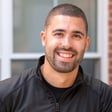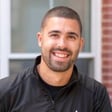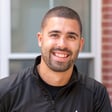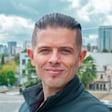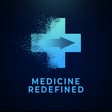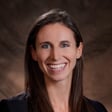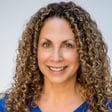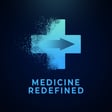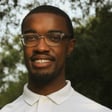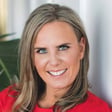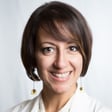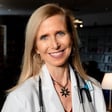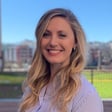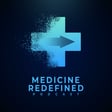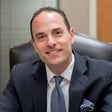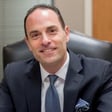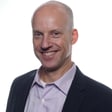Introduction to Medicine Redefined
00:00:07
Speaker
Welcome to Medicine Redefined, a podcast focusing on helping you reclaim ownership of your health. I'm Dr. Darshah. And I'm Dr. Altima Sharaja. We're your hosts, here to challenge conventional practices and uncover the stories behind pioneers shaping the future of medicine. Our conversations not only focus on the individual level to dissect common practices for health optimization, but also zoom out to enhance systemic change. Join us as we look to break the status quo, move the needle forward, and put the help back in healthcare.
Dr. Carchetti's Background and Approach
00:00:37
Speaker
Our guest today is Dr. Joseph Carchetti, board-certified physician of the Institute of Functional Medicine and founder of the Lower Guinid Functional Medicine Institute outside of Philadelphia. Dr. Carchetti earned his medical degree in Rome, Italy, and completed his residency in Chicago, Illinois. He has over 25 years of experience in internal and emergency medicine, and he is a medical marijuana-certifying physician.
00:01:00
Speaker
So Dr. Carchetti is deep into the weeds of functional medicine. He has an integrative approach as well, and he will address and treat things like immunity, disease prevention, energy problems such as chronic fatigue, fibromyalgia, hormone imbalance, cancer issues, and even weight management.
00:01:16
Speaker
Dr. Carchetti is fully focused on being patient centered, looking at the mind, body, and spirit. He'll also use approaches like gene analysis, sophisticated nutritional strategies, looking at herbal remedies, supplements, and even IV therapies. Dr. Carchetti is an avid athlete himself, a cyclist, and he has been a team medical physician for various professional cycling teams from the 1990s to the present.
00:01:40
Speaker
So in this episode, we start out by talking about his experience as an ED physician and what caused him to be super fed up with the current system. We then delve into why Dr. Carchetti chose functional medicine, what made it so attractive to practice. Specifically, we'll talk about why he set up his practice as a consultant, how he developed relationships with primary care physicians, and how he got his own patients vested into changing their lifestyle for the better. Enjoy this episode.
Newsletter and Community Engagement
00:02:06
Speaker
Hey everyone, real quick, we are excited to share that we launched our newsletter. It contains high yield insights from our guests and tips and tricks from us. We want to put the health back in healthcare and invite you to do the same by giving you the necessary information to live your best lives and provide value to those around you. Make sure to head to medicineredefined.com where you can input your email and stay up to date. Okay, time for the episode.
Transition from Emergency to Functional Medicine
00:02:30
Speaker
Dr. Joseph Carchetti, welcome to the Medicine Redefined podcast. Yeah, hi there.
00:02:36
Speaker
It is always a pleasure when I get a chance to talk to you. To catch the audience up, I met you when I was a fourth year medical student. And I was, I had the honor to rotate with you and do a functional medicine, you know, rotation with your practice. And, you know, I look back and going through medical school, going through residency,
00:02:54
Speaker
there hasn't been a time where I felt so energetic waking up in the morning, being passionate and really learning about the lifestyle medicine, functional medicine component, and talking to you, having some thought-provoking conversations, it was really eye-opening. And I knew that moving forward post-residency, this is something I really wanted to delve into. So I definitely cherish these opportunities, and I'm excited for the conversation we're about to have today. Excellent. Yeah, me too, also.
00:03:24
Speaker
Awesome. So let's first begin with your journey, right? Because I feel like people who transition into functional medicine, right? You start out as EM. They have a story. They have something that makes them look towards the other side of what healthcare could be, right? And for the audience that they might not understand what functional medicine is or means, and we've had a couple of functional medicine providers on this podcast, and we've delved into different types of systems.
00:03:50
Speaker
functional medicine, the reason it's called that is to pretty much go off the opposite, which is dysfunctional medicine, right? Which is what our healthcare system is. And so that's why it's termed functional medicine. And so obviously, as you're practicing emergency medicine, you see this other side of what healthcare could be. So take us a little bit through your journey as a EM doctor and the types of things you were seeing and maybe what you weren't happy about.
00:04:16
Speaker
Well, initially, having done EM and working through the system and everything else, you get used to the same thing over and over again. And what I found most compelling was the fact that for some reason,
00:04:36
Speaker
A fellow colleague came to me, and this is when I was in an emergency room in Philadelphia, which is no longer the hospital's closed down. And this guy comes to me. He says, listen, I've been listening to this guy.
00:04:52
Speaker
And it happens to be named Jeffrey Bland, who's this founder from this concept and everything else. And I said, yeah, yeah, yeah, yeah, yeah. And I was all gung-ho, heart attacks, strokes, amputations, save the world and everything
Functional vs Traditional Medicine Approaches
00:05:08
Speaker
else, whatever. And that's exciting. Don't get me wrong. That's really, really exciting. And I had to get it out of my system. I think it was very, very gratifying and everything else, whatever.
00:05:19
Speaker
Excuse me, as the years passed, I found that I was doing a lot of repetitive actions. Meaning that, in my opinion, an individual in this field, in the emergency department field, you really should not see people over and over again. And when the person comes back,
00:05:42
Speaker
and remembers you for whatever reason, it means to me that I'm not done my job. And I'm not getting solutions here. It's just one big problem after another. And the piece de des Istants, which happened to me, which is kind of a funny story, but once I got into this
00:06:07
Speaker
functional medicine idea, I started listening to this guy, Jeffrey Bland, and I still was doing ER. And I realized how much lack of information I had acquired in residency to utilize all the biochemical pathways, all the physiological pathways, and everything else. Whereas I knew how to deal with heart attacks and strokes and things of that nature itself.
00:06:36
Speaker
While this is going on, I happened to be, after a year of doing this, and I was fairly content doing everything I was doing, but I had a sense of repetitive action that I wasn't really being fulfilled as far as helping people, because some of the people did come back. So I actually went to another hospital.
00:06:59
Speaker
two years, I'm guessing, two years later, three years later, which is approximately 20, 30 miles from the present one that I'm talking about. And I'm working there, night shift, ER, you do all night shift and everything else. At 11, 30, 12 o'clock at night, there's this one patient walks in and he says, hey, Dr. Carchetti, I'm back, right? And this patient was a schizophrenic and he always wanted medication for schizophrenia.
00:07:29
Speaker
And I had been out of that previous hospital for years.
00:07:35
Speaker
And this guy, I don't know, he sought me out, but he recognized my voice, my name and everything else, whatever. And I knew done and there that if they remember my name five years down the road, there's something wrong with this whole process itself. And then I realized I was just writing one narcotic after another. I was writing more medications as far as any anxiety medications.
00:08:00
Speaker
and antibiotics, things of that nature. And while all this is going on, I am increasing my clinical acumen. I'm increasing my ability to remember all these biochemical pathways, which I was not exposed to in residency, let us know in medical school. And as everyone very well knows, that even today, maybe less so, you can
Growth and Challenges of Functional Medicine
00:08:25
Speaker
possibly correct me a little, whatever.
00:08:28
Speaker
What do they they they give you eight hours of nutrition courses if that are all probably at school, you know
00:08:36
Speaker
And the basis for a lot of biochemical pathways and whatnot are all based upon nutrition, energy factors, and biochemistry, whatever. Never knew that. So I got to the point that I got much more comfortable with it. I ended up going to a lot of these meetings and just opened an entire new world for me. And the beauty of this is people got results.
00:09:04
Speaker
they thanked me, which is huge, because the reason I went to medicine from the very, very beginning was to help people. And in the ED, you don't get thank yous.
00:09:15
Speaker
You get a lot of problems with individuals being dissatisfied, they're in pain, terrible things happen, heart attacks, strokes, things of that nature. You're dealing with pain. And I realized by dealing with pain or anything else, I was doing a lot of reactive medicine. Reactive medicine, basically, instead of fixing these people, they came back because I wasn't fixing them.
00:09:39
Speaker
And it convinced me to say, wait a second, what can I do to get a solution to all this? And it seemed to me, as I was accumulating more and more knowledge, that the way to do it is become what we will regard as a medical shock homes.
00:09:54
Speaker
You're not afforded the ability, whether in the ED or in a regular allopathic office, the time allotted through either the insurance companies or the backlog of patients, that you can sit down with the person and say, hey, doctor, see how you're doing, what's going on, how the wife and kids, you know, and what's going, you know, from that standpoint. You don't have to get to the point and why are you here, and while they're saying that, you're writing a script already.
00:10:22
Speaker
That's what I wound up doing in the beginning until I realized that I want to know what's going on with these people. When I finally started doing more and more, and by the way, it was difficult because the allopathic system does not condone spending more than eight or nine minutes a patient. It's not a good thing.
00:10:42
Speaker
It's a business, okay? And they don't tell you business in med school or in residency. They teach you fix the people, whatever. And you realize when you're out there, it is a business and you have to produce.
00:10:56
Speaker
instead of helping people from that standpoint. And when I was able eventually to start seeing some people on a part-time basis, spend the time and understanding and apply what I had learned in med school and residency, it says, wow.
00:11:13
Speaker
That's what it's all about. And I was able to help them and maybe not lower their blood pressure within a one-hour period, but, however, helped them in the long run. And they come back to me three, four, five years later, hey, how you doing? What's going on? Not to see. Long time, not to see. Doing fine and all that kind of stuff. And it was really, really, even today, to the state. I get people years after come back to see me and they moved out of the area.
00:11:40
Speaker
Yeah. And they're just they're just flourishing. They're doing a lot really, really well. In the meantime, this whole, I would say,
00:11:54
Speaker
process and this mentality that our society is undergoing, as you have mentioned, functional medicine is the big cue word these days. I can go now through one of the hospital systems that I work through, and I use the word functional medicine, and half of the people, they know what it is. When I started this in the early 90s, no one knew what it meant.
00:12:20
Speaker
Okay, so now it's commonplace, they understand it, and more and more people are segwaying into this concept because they find the results and you're helping people overall, that standpoint.
Role of Biochemistry in Medicine
00:12:32
Speaker
Furthermore, as a practitioner, you are gratified. It's very, very difficult as an intern when you're doing 36-hour shifts to be gratified. Your gratification comes from sleeping, okay? That's where that comes from.
00:12:46
Speaker
And so I positioned myself in such a manner that now, and it was very, very difficult because I was going against the grain.
00:12:58
Speaker
And when I met you, I had already went through that against the grain, and I was in a very positive sense. And since that time, it's been nothing but positivity from that standpoint. Even with all the negativity, now is the government systems or the insurance models or whatever, if they change the rules, we don't have to worry because of the fact that we're asking the right questions, we're getting the results, and it is what it is.
00:13:26
Speaker
And there's no going back. There really is no going back. Especially during COVID. COVID should have been the worst thing that happened to allopathic medicine. It's actually one of the best things to happen to functional medicine because we were applying a concept that we have initiated in the early 90s into today
00:13:48
Speaker
and we were getting wonderful results. And you didn't have to resort for medication, by the way. You can resort to other things. And as the big concept of functional medicine, food is medicine. We all go by that, from that perspective. And if you think about it, conceptually, anything that we ingest, anything that they expose, they're all chemicals anyway.
00:14:09
Speaker
whether it be food or medications. So I arrived at this point and there's no going back. The hours are better. I'm a happier person. I giggled. The old-time doctors of the 1950s is what we're doing now. I haven't seen any recently, but the doctors of the 1950s were the ones that were doing what we're doing right now.
00:14:36
Speaker
Yeah. They knew the local grocery store. They knew people around them, how's Marge and how's your son doing and things of that nature. We don't do that in allopathic medicine anymore, especially in the ER. More than five minutes, you're out the door. You got another 25 patients to save.
00:14:55
Speaker
And now I have afforded the ability to speak to people, think about it cognitively, and it's great. And if I don't know it, we look things up, and it's a learning process. And that's a wonderful thing. As one grows and matures in medicine or otherwise, you mature and you learn things. And the beauty about this is the fact that there are times that I speak to some patients that are very, very well-versed. And by the way,
00:15:24
Speaker
It is commonplace for the people that I see these days who are sick and tired of the system that's not helping them because they go over and over and over again, same medications, whatever. They come with charts literally six or eight inches deep. I mean, it's ridiculous.
00:15:43
Speaker
I'm and then when code came into play as i said it's really interesting because you know therapy immunology what's the big thing. No we were talking about me now we met me not had the solutions in the nineteen nineties but we were saying wouldn't be nice.
00:16:02
Speaker
to get a system in the body that's basically immunologically geared toward getting rid of cancer or getting toward rid of a disease process, whatever. We had the concept we didn't have the actual means to do it and lo and behold now the scientific community with millions of dollars have created
00:16:23
Speaker
I'm immunotherapy and all those other things out there to help us help us alone and that is just perfect a Playbook for us because we're just sitting pretty and we're just saying hey, I don't know what you were talking about it We were talking about the first ones. That's right. So It's funny. It's funny how
00:16:42
Speaker
And there's such an emphasis on biochemistry, like in your undergraduate years and your medical school years. And then you get into residency and you realize how much of that foundation is almost useless because we're just purely doing clinical medicine in the allopathic world. And we're not really applying those concepts like you said. And I tell the medical students all the time that I felt like medical school was a waste of those four years, right? Because we're not really learning how to apply
00:17:07
Speaker
those things that we learn and the things we are learning, I mean, 80% of it we're not really using. 10% of it is probably outdated. And so I tell them that I can almost take anyone off the streets, throw them into intern year, because it's just pattern recognition. I mean, that's the type of medicine that we practice was just looking at the clinical diagnosis, looking at the symptoms. This is the medication.
Precision Medicine vs Population-Based Approaches
00:17:27
Speaker
Next, next, next. And you get really good at that.
00:17:29
Speaker
And I honestly feel like in my intern year, that is how I truly learned. And I felt proficient at that. And then I came to that fourth year rotation. And I think most students despise biochemistry, but it's such a different tune to it when you know how to apply it, when it comes to the nutrition, when it comes to the immunology. So when you became certified in functional medicine, was that while you were also training in the emergency room or while you were practicing in the emergency
00:17:57
Speaker
No, no, I had finished. I was already working full-time in the emergency room, and I had to take time apart to actually go through the process of doing, as they say, the modules and the lectures and the follow-ups and everything. Yes. I see. Okay. And then you trained in Chicago, so I'm wondering how much does where you train? Because Chicago is not an easy place to train from what I hear from you, from a lot of my colleagues and stuff. It's going to be tough. That's true. This is true.
00:18:27
Speaker
The south side of Chicago is the baddest part of town. And believe me, it is. It really is. I remember some of those stories you were telling me, but how much of that played a factor in terms of how you saw allopathic medicine and for you to kind of get out of it? Or was it truly just the patients that you're seeing over and over again?
00:18:49
Speaker
No, no, that was maybe a catalyst. But you have to understand, I want to be clear about this, is the fact that acute care, allopathic medicine is the best of the world. Bar none. If you're having a heart attack, an MI, or if you're having a CVA, a stroke of some sort, this is the place to be.
00:19:07
Speaker
But we are finding more and more individuals out there that we're having more chronicity and we're having more immunological disorders and autoimmune disorders, things of that nature. If I would have told you 25, 30 years ago that I'd be talking about gut microbiome, I'd be crazy. And I would never think about that. Now, we kind of knew, and we knew the word. I mean, medical school teaches you the vocabulary.
00:19:36
Speaker
Yeah, yeah, yeah. The rest of the speech is the applicability of it itself. But, you know, I would never believe that. So it's very, very interesting that it's come like full circle, that those things that we despise, and I was one of them, by the way, I still remember the book, Leninger, the biochemistry book, that is like the really real thick and big pages and whatever.
00:20:00
Speaker
And you know, but when you can actually see it in patients and speak to them about it and then get these results that are valid. I mean, they're valid and you can see it and you can actually test and see what's going on. And you don't have to necessarily resort to a reactive medicine. I mean, most of my patients that I talk to, I try to reason with them and I say this, if you at 18, everything works.
00:20:31
Speaker
And now you're 50 years old and you have a high cholesterol or high blood pressure What does your doctor do and almost everyone tells you they give you a pill? Okay, then I ask them the next logical question
00:20:45
Speaker
If we were to really analyze that, are we resolving or creating a solution to that problem by giving you a pill? And if you look at it academically, you're really not. You're only lowering the blood pressure to make the numbers look better. But the reason that the blood pressure was elevated has not been addressed.
Pharmaceutical Industry and Antibiotic Resistance
00:21:05
Speaker
The same thing for your cholesterol. Why is your cholesterol good at 18 and at 50? It's high. Things have changed biochemically. They need to be addressed, whether it be nutrition or life choices or lifestyles, things of that nature itself. And we don't address those things in residency. Plus, we don't have time either. We're there to learn, boom, boom, boom, and just get it done and move on from that standpoint. So I realized that
00:21:32
Speaker
Though important in the acute care center, I do believe that down the road, we're going to have less acute care need and more chronic need, more long-term issues, autoimmunity, things of that nature itself. Our society is going down that path. And then complicated by that, there are a huge number of external factors between global warming
00:21:58
Speaker
changing of the food industry. And by medications by pharmaceutical companies that are constantly changing itself. I remember a very sobering thought. It took approximately 50 years for penicillin to become resistant since the introduction of penicillin. Whereas a molecule called fluoroquinolones took four years. Unbelievable.
00:22:26
Speaker
And that's not good for us. We as human beings, if we're getting resistant bacteria, we're not going to say you're too long. I was going to say, to harp on that, I was actually listening to a podcast about how pharmaceutical companies, their objective is to create one antibiotic that can cover as many things as possible because it's a bigger moneymaker for them rather than creating one antibiotic for one specific disease. Because if we had the latter,
00:22:52
Speaker
we would have much less of a chance to be resistant because we're just treating one specific disease one-to-one. But because we're forced to use, you know, fluoroquinolones for everything or vancomycin for everything or zosin for everything, we're creating a scenario where we're using the same antibiotic for five different systems. And, you know, I just wanted to throw that in there as far as, you know, if the audience is wondering, well, why isn't that we're becoming more resistant to these antibiotics?
00:23:17
Speaker
Well, I hope it's not that we in a medical community are becoming lazy. I hope that's not the case. But I do believe that there's a subcategory of individuals that are using what they call precision medicine.
00:23:32
Speaker
Precision medicine is basically what we're just talking about basically is understanding the factors becoming the medical Sherlock Holmes and Finding out the reason beyond it and then specifically addressing those specific entities and take care of them and and you're done
00:23:48
Speaker
You don't have to worry about resistance. But we're, unfortunately, due to the monetary factors and the monetization of the pharmaceutical industry, you're right. They want to use one thing, and that's going to cause the demise of the human species, I think.
00:24:06
Speaker
I do want to clarify for the audience, me and you, we're not anti-medicine because having that blood pressure medication or lip lowering, they can prevent at least long-term effects down the road. When these blood pressure numbers are too elevated, they can cause kidney issues and whatnot, but at the same time, just having a medication is not enough. We are trying to get deeper to the point where we can maybe take them off that medication and really actually solve why they had the blood pressure in the first place. Is that correct?
00:24:32
Speaker
I totally agree. I totally agree. I'm not saying that you care medicine is not valid. Don't get me wrong, as I just told you, the best in the world is here, okay? If you have a heart attack, you've got to be here because you can do, you can do antioplasty, things of that nature itself. If you have a stroke, you can do anticoagulation, things of that nature. That's very, very, very important.
00:24:52
Speaker
By the way, I'm not going to give you an herbal or a supplement to lower your cholesterol level right at the top. I mean, there are supplements that are out there and certain herbals that are out there that are adjunct and help the body system along to try to get to the right solution. By the way, most
00:25:20
Speaker
supplements and herbals out there, I mean, there's very, very little if no side effects, not just like most medications that actually change the body chemistry dramatically itself. The day we get to the point that we can pharmacologically, through the pharmacy, through the pharmacological companies, to be focused and address one thing without affecting anything else, that's gonna be the holy grail.
00:25:49
Speaker
Yeah, absolutely. And I'm waiting for it, but I don't see it. I mean, like, you know, for everything that we give a patient, there's always potential for side effects. It's a very, very sobering fact that most recently, since COVID came into play, and now more so, if you watch television between the hours of three and six or seven o'clock, you're going to see a slew of pharmaceutical companies promoting their product. 75% to 80% they talk about all side effects.
00:26:19
Speaker
75, all side effects. You can die, you can get a rash, you can get this, whatever.
Innovations in Functional Medicine
00:26:24
Speaker
Then at the last 10 seconds, they say, oh, but you need to buy this because it's going to help you alleviate something happening, whatever. You're going to go, and you'll happily have a raster. They got a beautiful picture of a person living on and having kids. Yeah, yeah, yeah.
00:26:43
Speaker
So it's really not like that, but they're good. I mean, I'm very, very critical because of the fact that I've been attuned to this type of thing. And I kind of grin sometimes because of the fact that here goes another one. I mean, after the end of COVID, it's amazing how, which I won't mention the pharmaceutical company, how a slew of increasing numbers of commercials that were out there to promote
00:27:13
Speaker
vaccinations, to promote antibiotics. What's unfortunate, and I want to make a stand on this factor, we know in the medical field, and you know this part better than anybody else, we know that these Alzheimer's drugs, Aricep specifically, was studied. It has no help whatsoever in any, it's a PubMed article, it doesn't help. And doctors are still prescribing it.
00:27:39
Speaker
Why are we doing such a thing? Yeah, no, exactly. I've had these discussions with attendings where some attendings will favor it and some attendings will say, this really isn't doing anything, even for aphasia, right? We see that a lot in rehab and dineposil or air sap is one of those medications that has been talked about in terms of getting that aphasia recovery. But how effective is it and what are the side effects and are we having a legitimate discussion, a thoughtful discussion about what side effects this might be causing or the static hypotension, things like that that we
00:28:09
Speaker
I see with patients, especially as they get older. Well, it would be nice. Think of it as a key. If we can find the exact key to alleviate pain, suffering, or a medication, do a medical problem, whatever, boom, boom, done deal, and then just move on to something, that would be wonderful for us. The complexity of the human species is so vast, it's going to be very, very difficult for us to do it, and we're doing the best that we can.
00:28:39
Speaker
Yeah, no, absolutely. I want to dive into the precision medicine aspect, right? Because we oftentimes use this key unlock analogy, but we also know that every individual is different, right? And that's what makes precision medicine so difficult, but so interesting, and yet people are trying to study for it and understand how we can use an N of one, right?
Challenges in Precision Medicine
00:28:59
Speaker
Do you know who Dr. Mike is?
00:29:02
Speaker
Dr. Mike? Yes, the popular. No, no, no, just Dr. Mike. I know him all too well. The social media guy? Yeah. Yeah, yeah, yeah, yeah. So he has a podcast out now, right? And he had a recent episode with a psychiatrist.
00:29:20
Speaker
Yeah, he's got a recent podcast out with he had a great episode recently with a psychiatrist psychiatrist named Dr. K. And it was they had a discussion and somewhat a contentious debate on precision medicine versus looking at population data, and then trying to figure out how it relates to the patient. But Dr. K said in Eastern medicine and Ayurveda, they really just look at n equals one, there is no population data, they look at your energy, they look at
00:29:48
Speaker
who you are, your own gut microbiome, all those things. When it comes to functional medicine, how do you parse out the N of one? How do you look at an individual when there's so much data on a population level that may or may not relate to that patient itself? Because I feel like precision medicine and population medicine, which is how we practice currently right now, we take data from whatever, but it may or may not relate to the patient in front of us,
00:30:16
Speaker
But yet that is still evidence-based or evidence-guided, right? And so we still have to be careful as physicians as to how we practice and how we prescribe. How do you determine all of that in your mind when you have a patient in front of you? I mean, it's a comfort level first. You want to make sure that you're getting, I don't believe, it was kind of funny.
00:30:42
Speaker
I was watching House M.D. the other day and the primary thing about the whole series is everybody lies. I don't believe that's the case.
00:30:57
Speaker
They're unable to explain themselves specifically. So I give them a lot of latitude to explain themselves. I tell them, listen, I know the science. You know your body better than anybody else. So I'm trying to find the specifics of what this individual, male, female, age, whatever it may be, what are they conveying to me itself, and how do I apply a piecemeal, the application, depending on what they tell me itself.
00:31:26
Speaker
It's not like a boilerplate stamp and that's it and nothing else is important. I try to parse it out so they guide me, they actually guide me for me to focusing on what systemic processes are going on. What I don't do is I don't look at an organic organ system.
00:31:49
Speaker
I was taught with organs. I was taught heart, lung, brain, whatever it be. Instead, I tried to look at the entire equation and try to put them all together. And if I let the individual speak for themselves, and then I apply the scientific vocabulary to it, they say, oh, yes. I mean, there's been a numerous amount of times. I'm always trying to find sentinel events.
00:32:19
Speaker
I'm always trying to find what caused this particular individual to present when they did. And it's not always possible, mind you. I'm not able to say, well, you know, in May 5th of 2022, I developed this. And I said, well, what happened the week before? Or something or something. And sometimes you'd be amazed. It's an aha moment.
00:32:43
Speaker
The patient doesn't know it, and I nip it in a button, and all I need to do is apply the biochemistry to all that, and we kind of figure those things out. It takes a little bit of time to parse it out, but it works. Can I ask, I just wanted to ask, are those sentinel events, are they usually like traumatic? Are they more mental events? Or can they even be, I use this soap bar and develop an allergic reaction or something?
00:33:09
Speaker
Well, you name it, it's out there. It doesn't have to be anything. You know that in immunology, you don't need necessarily a high dose dependent anything to call you to have some terrible effect itself. I've had people when they went on a medication, I've had people when they're on a supplement, I've had people that witnessed 9-11, I've had people that had a car accident.
00:33:38
Speaker
I've always found there's something going on with the individual that starts the snowball effect itself. These things do not happen overnight. And there are times that in biochemical pathways that the body is resilient, resilient, resilient, and then it reaches this tolerance level and then it tips over.
00:34:00
Speaker
That's a little bit more difficult because I can only do certain levels, blood levels, and ask certain questions to find out if the tolerance levels have been met in regarding to whatever the person is presenting to. But for the most part, if I'm able to find those things, I'm able to speak with the person. And together, I use a team effort here.
00:34:23
Speaker
I make sure that the patient's accountable for what they tell me. This is not like I know all and you do what I say. I want to make sure that they're accountable for their own actions so they get better results. I get better results. We are both happy and they have a smile on their face and say, wow, this stuff really works. And I said, of course it works. You just got to be persistent.
00:34:48
Speaker
from that perspective. I mean, but on the other hand, I always tell them, I said, you know, nature and the laws of the universe do not forgive us as human beings. If we do not follow the laws of thermodynamics or the universe or of nature, and we go against them, they're going to get you sooner or later. And I found this to be true.
00:35:08
Speaker
Yeah. Yeah. Yeah. It's karma. Yeah, exactly.
Building a Functional Medicine Practice
00:35:12
Speaker
It goes around. Right. So how do you convince, not even convince patients. I mean, how do you stay, right? So I'll back up. There's evidence based versus evidence informed, right? And I remember talking to you and you said, Hey, everything you do is with evidence. And for the listeners, I think in my opinion, evidence base is just strictly looking at the research and the data and that's it. You're really
00:35:33
Speaker
just looking at that when you make your prescriptions and your guidance. Evidence informed is a little more holistic. It's not only just looking at the evidence-based research, but also taking anecdote, looking at the patient in front of you, taking different experiences, which is critical in functional medicine, right? I mean, you look at patient and patient, you start to see patterns as well, and then you tend to, quote unquote, experiment a little bit to see if it works or not. But yet it is still with evidence. How do you...
00:36:02
Speaker
convince patients, talk to patients about you having evidence when they might be coming to you and seeing you for the first time and they hear a functional medicine, they might think it's quote unquote, woo woo. And you know, sometimes functional medicine gets a bad rap. What's that conversation that you're having with patients? Well, I believe in the educational process. And I always tell everybody, we are a team. We are going to work together.
00:36:25
Speaker
And I'm going to explain to you why I'm thinking and for a reason that I'm thinking it. And I will do the best that I can to give you either a PubMed article or where I'm getting all this knowledge from that you can say, oh, I get it. We can try it.
00:36:41
Speaker
So that's what I always say to them. So they're not only accountable, they're vested in this whole thing. And the more that they're vested, the better result they're going to have in reflection to whatever they take in that standpoint. If they falter, I mean, like I say to everybody, weight loss people, you know,
00:37:01
Speaker
And this happens to young people more often than anybody else. They want to lose weight, let's say. And I said, well, you know, by the way, this is a touchy subject now, especially with the GLPs and everything else. But be as it may, if you go and you do a really good job Monday through Friday,
00:37:26
Speaker
And then all of a sudden you say, well, I've lost four or five pounds. Good for you. And then Saturday comes along and you say, well, you know, um, I'm going to enjoy myself on Saturday. Well, I tell them you can't do that because number one, nature will not, will not, um, forgive you. And all that effort you've derived from money through Friday, you will have lost going out Saturday night at Outback. Basically all that.
00:37:53
Speaker
sacrifice you have done will go off or not. If you're in a pharmacological medication, you can have terrible side effects if you stop something abruptly or start something abruptly, what it may be. Whereas in this space, you're just going to lose the benefit when you've derived, and all that wonderful effort you've derived, you're going to lose it itself.
00:38:20
Speaker
And once I get a person to get some results, I just want them to continue in that habitual mindset so it's second nature to them. I mean, one of my famous things I tell anybody, I says, listen, I'm going to save you 30% of your money every day. How are you going to do that? I says, well, you're going to promise me from here on in, bar none, never bring children to the supermarket and always eat before you go.
00:38:49
Speaker
You will spend less money. And it is true. It is true. Now, don't get me wrong. I did not follow what I just told you once and I walked out the store with a $27 piece of cheese. I didn't need it.
00:39:02
Speaker
Okay. It isn't what it is. But you're Italian. We love food. It was a piece of cheese with truffles in it. You can't go wrong with that. Exactly. That sounds great. I did want to ask, so you talk about having the patient vested and having the conversation with you, trusting the process.
00:39:23
Speaker
How much does one's background, their own bias, their open-mindedness, and even their cultural background, right? Coming from an Indian background, I have more of an open-mindedness towards Ayurveda, let's say. How much of that plays a role when a patient comes to see you?
00:39:38
Speaker
very, very much. I don't want them to waste their time and if they don't even believe or have any inkling whatsoever that this is gonna work, don't waste your time because you have to really do something for this. It's not just like taking a pill and forgetting about it. That's simple. You can do that because you just take a pill and you walk away. But to create a process that you gotta follow day to day to day and you're gonna change your entire
00:40:07
Speaker
Being itself is a lot more difficult, but once you do that, it becomes second nature to you. I had a woman who was convinced to say, listen, I need to lose weight and my cholesterol is too high and I'm a CEO of a company and I fly to the West Coast once a week. Give me a pill.
00:40:30
Speaker
That's what she said, give me a pill. I said, wait, wait, wait, wait. First of all, let's talk about what you're eating. He says, no, no, no, no, no. If my cholesterol is high, I don't care. I'll take up a cholesterol pill. I said, you can't think that way. Because I'm worried about 10 years from now when you're going to be a menopause, OK, and you're going to have risk factors similar to men. And basically, you're going to have coronary artery disease and all the other things that are going on.
00:40:57
Speaker
and she just doesn't she didn't want to have it so she was invested in me and i said well i can only help you if you help yourself and if that's not feasible for you then i think that we better part ways because in fact it's not going to work and i feel comfortable with that
00:41:15
Speaker
I mean, I'm not going to rely on that if they're not vested in their own health itself. I mean, most people today are not vested in their health. They're blaming it on the doctor. They're blaming it on the system. It's your fault my cholesterol is high. It's your fault that your blood pressure is high, even though I go to McDonald's five days a week.
00:41:35
Speaker
They try to defuse that to the other parties themselves. And I feel that we as a society should be accountable for that kind of stuff. So with your current practice, you serve as the role of a consultant, right? Rather than the actual primary care? Yeah. How? Why did you choose to be the consultant rather than take over essentially, as their doctor?
Consultancy in Functional Medicine
00:42:00
Speaker
Um, it was, it was, one was a practical means. Okay. And another one was basically is the fact that, um, being a single practitioner, um, to be on call 24 hours a day is a hard sell. Okay. Um, secondly, um, you would have to have legally a answering service to answer telephone calls and call the patients back themselves. Um,
00:42:26
Speaker
Thirdly, what I do is not medication-based. It's more nutritionally-based, supplement-based, things of that nature. So there's no such thing as an emergency vitamin C here. There's no such thing as an emergency, you know, I got to take an ashwagandha urgently. I mean, that's not going to happen. So there's really no need for me to urgently have any intervention.
00:42:53
Speaker
I mean, don't get me wrong, years ago, this is way before while I was in the ER, guy walks in, he says, listen, Doc, I need an emergency Botox. And I said, then what the hell is emergency Botox? He says, I got to go to New York City because I had to go to a party and I have to have my skin look good. I said, you're in the ER, I can't give you a Botox, you know? So he went his merry whole way.
00:43:19
Speaker
It also takes three days to kick in for those who are looking for emergency Botox. That's true. There are some people that are not convinced. That's true. That's very true. How do you set boundaries? Because I remember when I was with you, there would be some patients who would constantly email you, maybe send you a novel about what might be going on. How do you deal with that as being a consultant?
00:43:43
Speaker
That's a great question because I do have individuals that do that. I've come down to the level now that before I even begin, I tell the patient, number one, I don't see my, and I said also because of COVID, which has helped me a little bit, I'm so backlogged with emails, it's gonna take me a number of days to respond. Number two,
00:44:08
Speaker
I don't do acute care medicine. And therefore, if you have any problems, feel free to avail yourself of an urgent care or an ER from that standpoint. Because if it's that urgent,
00:44:23
Speaker
They need to go to the ER anyway. And there's nothing that I can do. I'm not going to write an emergency ashwagandha order or things of that nature or send them a supplement that's as important. So as long as they understand that and they have to stay in the course.
00:44:39
Speaker
from that perspective. I rarely, and I mean, and I've been doing this since 2000 now, I rarely had an individual in the office ask me for an emergency anything. Not blood pressure, not heart or anything else, maybe something as an infection, but the person needs to be seen at that point.
00:45:06
Speaker
And it's not at that point, they're better off going to urgent care if they don't want to wait or an ER to take a look at the mouth or ears, whatever it may be from that perspective. I would never write a medication for blush and just give it. Oh, don't worry about it. I've had it before. You can't do that.
00:45:26
Speaker
Yeah. How do you work with primary care physicians, right? Because you're being the consultant and there might be some advice you have, go down with the cholesterol medication, get rid of this side effect of written blood pressure medication, you know, what
Evolution of Functional Medicine
00:45:40
Speaker
have you. Are you telling the patient to have a conversation with the PCP about it or, you know, how can you be that convincing or how can the primary care physician adhere to your advice?
00:45:52
Speaker
I mean, I'm convincing because of the fact that I tell the patient that I will work with your primary care. What we do will not interact or dissuade you from following their suggestions. And I'm not going to countermand what a primary care doctor does. I respect them highly for what they're doing itself. I just have a different set of tools that I can apply that they're not applying.
00:46:20
Speaker
Furthermore, I've had a couple conversations with some primary care physicians, and they had no idea. Now, I think it's incredulous, but at the time, I just accepted it. How come you don't know what co-cutaneous? How long you don't know what ashwagandha does? I can't conceive that right now.
00:46:40
Speaker
At that time, I had to educate them a little bit in that context itself. Now, with the statin drugs, we know that CoQ10 is being decimated by statin drugs, and I think that family practitioners are going to understand it a little bit. In the acute care arena, it disturbs me, especially, and I've had a lot of conversations because I deal with a lot of cancer patients in my IV section of the practice, that how the oncologists are not
00:47:11
Speaker
instructive enough to help the patient along their cancer journey because of the fact that how can you say, and this is really, really disturbing to me, how can you say, Dr. Smith, whatever, what should I eat? I have lung cancer. It is something I should avoid or something I could do to help me
00:47:33
Speaker
tolerate better the chemo or get away from the cancer, whatever. And then when they respond, Mr. Joe, you can eat whatever you want. I cringe. I really cringe because we know in the double blind placebo control studies in the laboratory, that if you expose certain things, cancer cells or bacteria or viruses, they're going to get worse.
00:48:00
Speaker
And you want to avoid those type of things. And I don't see that happening in the allopathic sense. So I always try to speak to them by saying, well, I mean, right now, the nutritionists and the dieticians in the hospital systems, OK, they don't give anything they want. You should see what they feed the patients who are undergoing chemo and radiation or anything else, whatever.
00:48:27
Speaker
We know that if you give high doses of oxygen or vitamin C in a laboratory to certain types of cancer cells, they die.
00:48:36
Speaker
Well, that's one thing that you can consider. But also, if you just put it teeming with sugar products, they're going to thrive. And I'm not seeing the oncologist really saying the opposite. So I try to educate the primary care by saying, please have a discussion with the patient. I always do, so they understand what they're supposed to do. And by the way, some people, I had a wonderful lady
00:49:05
Speaker
who had multiple melanoma, and she says, Doc, you can make me vegan, you can do this, you can do that, but there's one thing you can't take away from me. I gotta have my chocolate every day. I said, okay, it's not optimal, but okay. As long as she knows the consequences.
00:49:30
Speaker
When you were first building up this functional medicine practice, nowadays it's probably easier to get patients. People have heard of it on social media. They look it up on Google. They find you, SEO, all that. But when you're first developing it, 90s, 2000s, did you have to go to the primary care physicians to explain what you did to try to attract patients? Or were people just coming to you with the hopes that they might be able to reverse or treat chronic disease knowing what you did?
00:49:58
Speaker
Well, what I wound up doing the first couple years, I actually wound up going to local conventions, a wellness center, wellness places, a lecture, have a booth, just talk about what I do from that perspective itself. Plus the Institute for Functional Medicine had a doctoral referral center that you could get people from. And then there was the implementation of the
00:50:23
Speaker
of the website of trying to find out what's going on from that perspective, all those three modalities. And it was slow. It was slow in the beginning. It was very, very difficult. And sooner or later, by virtue of the system,
00:50:41
Speaker
The things got promoted and it got more expressed by important doctors. They were talking about it. Then there was the Dr. Oz. He was on television. Penn has an integrated medicine department. Believe it or not, they do. Jefferson too.
00:51:07
Speaker
Yeah, I know that too. I know, I know they do too, but they follow more pseudo allopathic somewhat integrative. So, but, um, but it's all good. It's much better than it was. So, but I'm, I'm glad those things didn't exist
Future of Medicine with AI
00:51:23
Speaker
before. If we have individuals that families who are independently wealthy and do and contribute
00:51:33
Speaker
monies to integrative centers, we can do research to that degree and validate the community so we can apply these types of things so it'll be equal. It went from chiropractors got more accepted, BOs got more accepted, MDs now they're equal. Actually, they're probably better. That's right. That's right, Dr. Carcetti.
00:52:02
Speaker
Well, on that topic, anyone can get certified in functional medicine, right, as a healthcare provider. You mean nutritionist, chiropractor, physical therapist, DO, MD, nurse practitioner, whatever may have you. I feel like the modules are standardized, right? The treatments even can be standardized, right? You're doing specific tests, whether it be the gut, whether you're looking at genetics, there could be IV treatments or supplementation. You can do things like DEXA scans and different modalities, maybe even injections.
00:52:30
Speaker
How do you differentiate yourself as a physician when it comes to functional medicine? Well, that's one of my difficulties that I have with the organization because they're not distinguishing enough that difference. But what I wind up doing is the fact that I say, listen, I can order
00:52:52
Speaker
tests I and I can read them I can order x-rays things that a nutritionist cannot do I can order medications in case something happens from that standpoint so I'm putting all those things together
00:53:26
Speaker
They see the results. It's high, it's low, and they know everything about nutrition. But the interpretation is kind of important. And as a physician, I give a different nuance, more knowledge in the context. And when I go down the path of, there's a difference between a dietitian and a nutritionist. A dietitian knows diets. That's it.
00:53:28
Speaker
to help you as a person.
00:53:53
Speaker
A nutritionist understands more the biochemistry of the food and hopefully applies it accordingly. A physician understands where these energies, biochemistries interact with the system and the disease processes associated with them. So there's a level of sophistication and a level of knowledge that other
00:54:20
Speaker
specialties don't do. So I have to distinguish myself by saying I'm a physician that does this. It's not just I'm a certified functional medicine practitioner and anybody in the mother off the street can possibly do that. And I'm hoping that we as an organization come down to and either separate the distinction between a physician and a nutritionist or an acupuncture or whatever, right, from that perspective.
00:54:47
Speaker
Is it surprising that it hasn't happened yet, given that you have Dr. Mark Hyman, Dr. Jeffrey Blair, you have physicians that are kind of leading this charge? Yeah, I agree with that. I actually, we had an international meeting two years ago and I was a big mouth and I stood up and I asked my question and I got quashed. There's too much money to be had. I mean, but
00:55:15
Speaker
I mean, yes, sure, everything comes down to the money again in business, which I get it, right? At least we're practicing in a sense that we're passionate about and yeah, yeah, I guess it comes down to that. Well, if I speak to a founding practitioner and I update them, what I'm doing, whatever, and I educate them a little bit, which is all fine and dandy, but through a chiropractor, they're not able to write prescriptions. Right.
00:55:44
Speaker
And they convinced. And by the way, they're really good.
00:55:48
Speaker
Verbally of convincing the patient that they don't you know, they don't need anything else and and whatnot So theoretically, they're not able to able to write for for black tests and and and whatnot I think they are able to write for x-rays as a chiropractor because they use x-rays but they're kind of limited in other sense, so you know, there's certain things that physicians can do that the other
00:56:17
Speaker
practitioners are not able to do. Yeah. Yeah. So it's definitely double downing on those skillsets to at least differentiate because I assume almost most functional medicine practitioners are cash-based, right? I mean, insurance is not going to cover these things. And if so, the reimbursement is going to be super low. I tried. I unfortunately had the unfortunate encounter with the president of
00:56:38
Speaker
Blue Cross Blue Shield in Pennsylvania years ago. I actually went to the home base and I spoke to them. I said, listen, I'm in the process of doing this and I think I can really save you and I use the business model. I can save you a lot of money by avoiding open heart surgeries, heart attacks and things of that nature. If you're able to give me
00:56:59
Speaker
a thousand subscribers, and this was when I was trying to build up the practice, a thousand subscribers, and I would teach them basically the nutrition and things of that nature, so they'll eat well, and they'll do all these wonderful things well, and they won't get sick. And they turned around to me and he says, we don't care.
00:57:17
Speaker
They weren't vested. They would rather let the few patients die and then risk the open-heart surgeries instead of teaching the majority of human society the beneficial things. Now, that's only one insurance company. Now, there's a lot of others out there itself. I presume that they're all in the same boat. Yeah, profits over health, right?
00:57:43
Speaker
I mean, I don't think these things happen in socialized systems as much, if at all. I don't think it happens in Canada. I know it doesn't happen in Europe. I've worked there, and that's a totally different animal right there.
00:57:59
Speaker
So speaking of the topics and the things we learn in functional medicine, you know, the world is changing. There's always new data coming out. There's new fads. People are always having discussions about precision medicine, nutrient genomics, wellness, et cetera. What are maybe some of the things that you've changed your mind on over the last five to 10 years that you once thought, you know, could be, quote unquote, the holy grail or really doing good on patients, but you've now kind of looked the other way.
00:58:25
Speaker
I thought that everything, I mean, it's true that a lot of things are all centered on the gut with the immune system, the microbiome and everything else. And I thought it was 100% across the board from that perspective. And now I kind of backed off by saying maybe it's only like 80% itself. So I'm a lot more
00:58:48
Speaker
careful on the applicability of saying that the gut does everything itself. It does do a lot of things. Don't get me wrong. And by the way, I always start in the gut because that's the holy grail right there. I mean, if that doesn't work, nothing else is going to work from that perspective. And the facts that we've
00:59:11
Speaker
I've attempted to say in the 90s, why don't we develop a system, again, we didn't know the answer to this, a system that focuses specifically on cancer cells or antibiotics, things of that nature, and focus on an immunological aspect of it, and now they're actually doing it itself.
00:59:31
Speaker
from that perspective. Actually, interestingly enough, to my knowledge, I think Pfizer or one of the other pharmaceutical companies actually has functional medicine doctors that give them some insight, okay, when they're developing their formulas and whatnot. Not in the vaccination department, but in the antibiotic department.
00:59:55
Speaker
because I guess they have to figure out the microbiome. And I actually know the one person that works there.
01:00:02
Speaker
Very interesting. Very, very interesting. How do you feel about alcohol? There's been a lot of talk lately on social media, almost people alcohol shaming in a way. And I'm not promoting drinking alcohol and binging and all that, but I'm okay with patients having a glass here or there. But there seems to be this almost witch hunt that I find on social media. And I know you're a sommelier, correct, in Italy. So I mean, wine is close to your heart.
01:00:31
Speaker
What do you tell your patients about alcohol? What are your thoughts on it? Well, if there's any liver problems at all, I have to stand strong by saying your liver is at risk. You can't even get near the stuff. Even the slightest will kill you. I mean, that's a scare tactic, and I have to abide by that. Between that and the pancreas, I mean, it's very, very important that they understand it because they have those implications. Whereas,
01:01:01
Speaker
In the past, the research stated that red wine drinking was helpful for the body and things of that nature itself. And I'm finding there's a lot of culture associated with this. If you go to Ireland and you see that the average person drinks half a quart of whiskey a day,
01:01:25
Speaker
Or if you go to Paris and they drink a liter of wine a day, are they declared alcoholics? And both of those societies, absolutely not. Because they eat and that's a part of their daily behavior. They don't drink for drinking, they drink for eating.
01:01:48
Speaker
Now, if I were to say that in New York City, you're outright alcoholics. Because we as a society, all you want to do is get blitzed. You just want to go get drunk. You don't drink alcohol in that context.
01:02:05
Speaker
I still think that moderation is always thick in here, but it has to do with culture. I mean, if you eat, if you perfectly associate a wine with food, it goes hand in hand. But because if you've ever cooked with alcohol, can you get a frying pan?
01:02:28
Speaker
and you put oil in the frying pan. And then you put a glass or two of wine there. What happens to the oil? It emulsifies. It breaks down. And that's what happens in the stomach.
01:02:41
Speaker
If you're eating fats, that's what happens in the stomach. Now, I'm not even condoning imbibing to ridiculous degrees. Absolutely not. But I'm saying that there is a beneficial aspect of it, but it's going to be very, very difficult with the shaming that's going on. I'm being very, very careful now of you mentioning it as opposed to previously, I used to mention it to everybody, and now I have to pick and choose.
01:03:07
Speaker
I can definitely highlight the cultural aspect when I was in Tuscany last year with my wife and we go around to the different vineyards and do a tour. And one of them mentioned how culturally important it is given World War II in Italy and a lot of famine. And so a glass of wine even given to children just to get them the calories that they needed. And so there's just so much history behind even that glass of wine and that's why they hold it.
01:03:33
Speaker
And I think having those connections are important, and looking at it so black and white is ridiculous. We've talked about the blue zones, and now there's that documentary on Netflix that came out, lived to 100, that talks about the social connection and how that might just be influenced through alcohol as well. So yeah, in an isolated incident, alcohol is a toxin, but I think it's important to look at it with context and see what the environment is behind people who are drinking it.
01:04:02
Speaker
Thank you for that. Dr. Project, is there anything you are excited about, about the future, about new technologies, anything that you're kind of focusing your research more on? Excited, but also very much apprehension.
01:04:21
Speaker
OK? You know where I'm going with this. I think that there's going to be a lot of benefits with this AI solution that's going to be given to us down the road. But I'm also worried that it's going to be also has a negative impact from a society standpoint. If it was only medical, I would say, let's go for it. And that's it. It's not going to be only medical. But the fact that you're going to be able to get
01:04:49
Speaker
Have a conversation, okay? And get a proverbial diagnosis is kind of important as long as there's a history, meaning that if this AI has accumulated knowledge of gray zones and the art of medicine, whatever, that's one thing. But Dr. Google, which is basically plus or minus, and that's it, you take this antibiotic or you take this medication,
01:05:18
Speaker
that I don't agree with from that standpoint. I'm hoping that we do, since we already advocated immunotherapy indirectly in the 1990s, that we get to the point that we're going to be better able to be focused, cause, effect,
01:05:35
Speaker
from the perspective of trying to help individuals alleviate pain, diseases, things of that nature, and without the possibility of them having side effects itself. Because medications today, no matter what you give, what you take, there's also the potential for side effects.
01:05:52
Speaker
Yeah, I think it's going to be the inevitable future, especially as you make iteration after iteration of AI to get it to the level that we're talking about of what we want. It's going to have to go through that phase of unreliability, the works until it can really be refined. And so yeah, it absolutely is a scary aspect of it. And that's why there's a lot of people pushing to slow down AI so that we can make it as reliable as possible instead of ramping up too quickly and then
01:06:17
Speaker
who knows what the repercussions are at that point. So yeah, I totally agree. I would love for it right now, and I'll go and even quote me on this, if that, down the road, that the understanding of the human genome, of the DNA, and what it could possibly figure out for us.
01:06:40
Speaker
on how to alleviate the diseases that happen in utero and things of that nature. It would be fascinating to know. There must be, you know, we already know that there's CAR T therapy, there's gene splicing is going on or whatever. If we can get that refined in the next 50 years, that will be huge. I'm hoping to see it.
01:07:04
Speaker
Yeah, the future looks promising. I think the important part is there's a lot of people talking about this, you know, talking shop on social media. And there's, as we talked about earlier, a lot of patients are no longer patients. They're becoming consumers and they're taking charge of their own health. They're looking at wearables. They're looking at technology. They're listening to podcasts. Um, they're going to providers like you and following your guidance. And so hopefully, you know, we start to have a revolution here, um, going in the right direction. Um, so yeah.
01:07:32
Speaker
When you get a positive feedback, and you just mentioned that, wearables right now. I have a Gorman watch right now, and I went to the F degree because I'm very, very off the top, whatever, and I want to buy this oral ring.
01:07:47
Speaker
And basically, it's a computer on my finger. And it gives me guidance. So if I'm not around and they want to call me in the office, they can look at this and they can say, wait a second here. I didn't sleep. I did sleep. This is going on. I'm going. It gives them some more information. And I think this is going to be very, very helpful down the road. We're going to probably be able to download this on an EMR program of some sort and utilize it for our benefit.
01:08:13
Speaker
I think that's a wonderful thing. I would love to be involved in something like that. I don't know if the company is possibly considering it, if it's too complicated, but I don't know. But the fact of the matter is, if this company can tell you by wearing this ring when your period's coming, that to me is a big deal.
01:08:34
Speaker
And they actually found the analytics on this. They can, within a 98 percentile, I think, right now, they can tell a woman's period within four hours once it's gonna start. That's... Oh, I didn't know that. Pretty amazing. That is amazing. Wow.
01:08:52
Speaker
Well, Dr. Carchetti, our listeners have probably been loving your energy, loving this episode. You practice outside of the Philadelphia area. Where can listeners go to learn more about what you do? And if they maybe are interested in contacting you, where should they head to?
01:09:10
Speaker
Well, my website is lgfunctionalmedicine. L is in Larry, G is in George, and functionalmedicine.com. And I have all the description of that. And you're going to feel free to call. And I have a wonderful office manager.
01:09:25
Speaker
that she's very, very well versed in describing all the nuances out there. She knows what I do. She sees it, whatever, and she's able to describe these type of things because it's always inevitable that a patient has a question, an unusual question. And to me, it's a challenge. And the challenge is basically trying to figure things out, and I'm always there open to work with somebody to get their solutions.
01:09:49
Speaker
I love that. I think the draw to me to functional medicine, I was telling my wife this the other day is the critical thinking aspect, right? I think we go to medical school, we love the critical thinking, but then everything becomes so dumbed down to just pattern recognition that you forget how to use your brain almost. And functional medicine really enlivens the brain again, enlivens you, and it really just, you're putting a puzzle together and then getting that reward like you talked about is just, it's really amazing. And I think, yeah.
01:10:17
Speaker
After rotating with you, I know what I'm doing with my career. So I definitely appreciate it, Dr. Carchetti. Yeah, I mean, one last thing is I want to make a, I was in the hospital, when I did my residency, we had a hierarchy, the attending, the big shot doctor with the long white lab coat, then came the fellow, then came the residents, then came the nurses, and then came the peons and everything else.
01:10:44
Speaker
Today, I have found that if you go around, people are walking around, you're being assailed with like 17 computers. Everyone has a computer in front of them and they're not looking at the patient. And I feel that what we're doing in functional medicine is we're looking at the patient, we're engaging with them. I was always taught, touch the patient.
01:11:08
Speaker
That communication skill is very, very important, and I think you can never, you can't get by that. You can be the greatest technician, but if you don't have social skills and you're not able to have emotional interaction with the person itself, then you're not going to be able to be successful.
01:11:24
Speaker
Dr. Carchetti, before I ask you the last question, I just want to thank you again for coming on here. I know this was probably three, four years in the making, and so we finally made it happen. I'll never forget you saying how your biggest strength and weakness is probably, and I'll paraphrase here, is that when you see a patient
01:11:41
Speaker
you basically let them go. And you might never see them again. But that is the type of medicine I think that we all need to practice is that instead of that business model, that recurring payment that we can get is to teach them how to live the life that they want on their terms. And so thank you for the work you do. With that, though, our last question is, and you can summarize here because I know we just spent pretty much an hour about it, is that how do we put the health back in health care?
01:12:09
Speaker
That's a loaded question. That's an unfair last question. That'd be another hour. There are few systems in the world that I've worked with, especially the European systems that are socialized, whatever, that I found that the culture, the mentality of health develops at birth.
01:12:40
Speaker
We don't have that here. And I would love for us to reacquire the nuclear family, the camaraderie. I mean, today is very unusual to have a family together at dinner time to talk about things. How was your day and whatever. Even today in Paris, France,
01:12:59
Speaker
If you go to England, let us learn, or if they go to the pub or in Italy, you're going to have people together exchange information. I don't feel well, you know, my grandmother did this, this and this, whatever. You can get information and you can
01:13:16
Speaker
Eat well, be happy, exchange overall, and you're going to be less likely to have problems in life because you're not going to be stressed out. You'll sleep better, you'll have good sleep health, more awake health, all that type of stuff. I think it starts with
01:13:34
Speaker
We as a culture, the solution is not technology. I really don't believe so. I think it comes in within our soul. And when it all is said and done, sometimes we're better off going back to zero, going back to the fundamentals. We who we are. I don't think we've had a guess to actually answer it that way. So that's very well said, beautiful. Well, thank you so much, Dr. Carcetti. Appreciate you.
01:14:03
Speaker
Okay, thank you. It's been a pleasure.
01:14:25
Speaker
Please also check out our social media platforms where you can find more content like this, and you can follow us on Instagram, Twitter, and TikTok at medredefine. We also want to thank our team for the production of this podcast, specifically Ethan Joo, Haritha Yipri, Zannie Lugmani, and Sarah Khan. And lastly, please remember that important disclaimer that everything in this podcast is for educational purposes only. It does not cost you the practice of medicine, nor should it be construed as medical advice.
01:14:47
Speaker
No physician patient relationship is formed and anything discussed in this podcast does not represent the views of our employers. We recommend that you seek the guidance of your personal position or coach regarding any specific health related issues. However, if you enjoy the show, please be sure to subscribe, review and share with anyone who you think will gain value from this. And until next time, thank you for listening.

